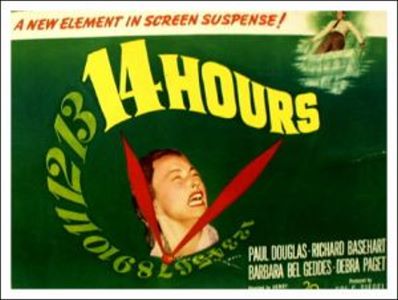
FOURTEEN HOURS
US, 1951, 92 minutes, Black and White.
Paul Douglas, Richard Basehart , Barbara Bel Geddes, Agnes Moorehead, Robert Keith, Howard Da Silva, Debra Paget, Grace Kelly, Jeffrey Hunter.
Directed by Henry Hathaway.
Fourteen Hours was a famous minor film that succeeded well in what it set out to do: show a desperate situation and its resolution, help the audience to understand why it happened and keep them in a state of sustained suspense as to the outcome of the film.
Richard Basehart plays Robert, a troubled man who goes out on to a ledge fifteen stories up on a Manhattan Hotel. He stands there, upset, trying to choose whether to jump or not. The film shows the elaborate methods the authorities take to try to get him off; it also shows his growing friendship with the traffic policeman (Paul Douglas) who first saw him on the ledge. We get to understand his background as his mother and father come to speak with him.
The film also balances the interest in Robert with small, but effective sub-plots, involving Grace Kelly, Debra Paget and Jeffrey Hunter.
The film is gripping, well-paced and thought-provoking.
1. Did the story of the film seem plausible or did you think it was far-fetched or impossible? Why?
2. Why did Robert go out on to the ledge? Did he go out intending to jump?
3. The psychiatrists stressed that he had to make a choice and going on to the ledge gave him a real possibility of choice. How was this? Why did Robert dread the police coming close to him and asking people not to crowd him?
4. What was his family background? Why did his mother 'mother' him so much? (Note her comments to the reporters about wanting to be a musical artist, but accepting the baby when she was only 18.) Why did he hate his father? Did he have good reasons? How much did his mother influence him?
5. Who was the better parent to Robert, mother or father?
6. Why did Robert relate well to Donegan? How did Donegan make himself so acceptable? How did he compare with the psychiatrists and with the chief of police?
7. Comment on the importance in the film of the bystanders. Why did they watch and stay there all day? Comment on the attitudes and behaviour of the taxi drivers and their sweep; the young couple; the wife who intended divorcing her husband (why did she change her mind?); the T.V. people; the press reporters; the faith and magnetism healer.
8. Should Donegan have tried to deceive Robert to get him off the ledge? Should he have gone along completely with Robert's wishes? What about the scene where Donegan is angry and Robert apologises?
9. How did Donegan succeed in helping Robert to a decision?
10. What was the role of Virginia and her remembering of the poem?
11. Should so many police and firemen etc., have spent the day trying to get Robert off the ledge? Why? Did you agree with all the methods they tried?
12. Did this film help you to understand why people want to kill themselves? What action would you take with such a person? What advice would you give?